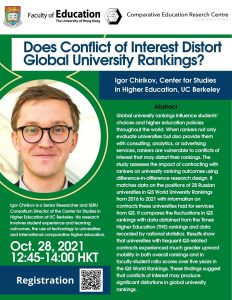On October 28, 2021, CERC hosted a webinar by Dr. Igor Chirikov, a Senior Researcher and SERU Consortium Director at the Center for Studies in Higher Education, University of California, Berkeley. His presentation addressed the challenges of avoiding the conflict interest in the global university rankings. As Dr. Chirikov argues, “Global university rankings influence students’ choices and higher education policies evaluate universities but also provide them with consulting, analytics, or advertising services, rankers are vulnerable to conflicts of interest that may distort their rankings. The study assesses the impact of contracting with rankers on university ranking outcomes using difference-in-difference research design. It matches data on the positions of 28 Russian universities in QS World University Rankings from 2016 to 2021 with information on contracts these universities had for services from QS. It compares the fluctuations in QS rankings with data obtained from the Times Higher Education (THE) rankings and data recorded by national statistics. Results show that universities with frequent QS-related contracts experienced much greater upward mobility in both overall rankings and in faculty-student ratio scores over five years in the QS World Rankings. These findings suggest that conflicts of interest may produce significant distortions in global university rankings.”













